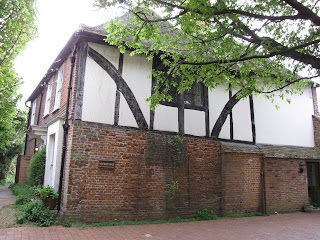My present community in Korea is actually the third time there have been Anglican male religious in Korea.
The first was in the early mission days in the 1890s when new and largely unformed members of the Society of the Sacred Mission struggled to maintain some form of community life despite the needs of an overstretched mission field. The lay brothers mostly left - both Korea and SSM - while the priest brothers mostly remained in Korea but left SSM. An exception was Fr Henry Drake who remained in SSM and later returned to Korea when Mark Trollope (ex SSM) was bishop.
The Society of St John the Evangelist in Cambridge, MA, was also involved. Recent correspondence with Fr David Allen SSJE has reminded me of this history and he has supplied the following information.
Fr.
Walter Perry Morse, SSJE, died March 23, 1976, in Cambridge, MA, in the 84th year of his life, having been flown by medical evacuation from Taipei, Taiwan, 9 days earlier.
He and Fr. McDonald SSJE were both in Korea 1922 to 1924. Fr. McDonald took his life vows in 1924 in Korea while he was still there.
Fr. Morse was also in Korea 1930 to 33, then in Japan 1934 to 37, and in China 1937-41, when he fled over the Himalayas. He returned to China in 1945, but soon had to move to Tibet, where he stayed until 1952. After a short return to the USA he went to Taiwan where he remained, except for short visits to the SSJE houses in Japan, until he was evacuated in 1976.
Fr.
Raymond Thomas McDonald, SSJE, died July 27, 1973, in Boston, MA, in the 80th year of his life. He was in Korea from 1922 to 1924, but he carried an abiding love for Korea in his heart. During his final illness, using a Korean dictionary, he taught some Korean to a close friend so that they could recite the Lord's Prayer together in Korean when she visited him. After he left Korea most of his ministry was in the USA, a few years in San Francisco when the SSJE was in charge of the Church of the Advent of Christ the King, the rest of it was in Boston, and finally in Cambridge until he was hospitalized in 1972 in Boston.
===================
Thanks to Fr Allen (who had a substantial part of his ministry in Japan and who still keeps an interest in Asia) for the information and for reminding me and others of this layer of history, which is now in some way part of the foundation for what has come later.











